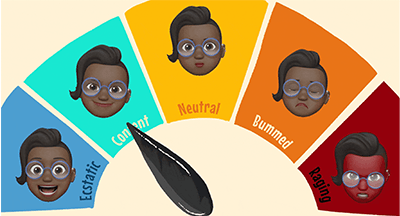
Believe it or not, this idea was born before 2020 reared its life-altering head.
Really, it’s simple, and it stems from the honorable intention to shed light on the important work done in schools. Not the report cards or the standardized tests, but the act of graduating good people. The process of creating a culture that helps students thrive and teachers shine.
Especially right now, it’s easy for the challenges to dominate our conversations. They’re important. They’re important. They can’t wait. But in the last five minutes, two minutes, 30 seconds, consider tossing in these four magic words:
Tell me something good.
Let’s go.
Why does this emotional stuff matter, anyway?
Okay, I get it. I’ve heard it before, and I totally understand. There are big fish to fry, especially nowadays. But hear me out. The ones frying the fish? They need it.There’s a ton of research about the benefits of whole-child education. Students who attend schools where adults view their achievement in terms of not only grades, but physical and mental wellbeing too, have healthier outcomes, are able to manage serious trauma, and learn better. Research shows us educating and caring for the whole child helps foster the thinking skills needed to excel in college and career after graduation.
There’s a method to whole-child education, and it doesn’t hurt to extend the concept to whole-person staff coaching.
Four easy words, huge emotional payoff
It’s okay to give a warning. In fact, for some folks, the warning might be key to getting this initiative off the ground. I’m willing to bet a fair number of readers are thinking about this in terms of the vein-chilling “Let’s go around the room and introduce ourselves with a fun fact,” which for most introverts puts the ice into icebreaker. The more everyone practices, the more it becomes ingrained in the culture, the easier it is to just talk about something good.Especially in a professional setting, it may seem odd or forced at first to implement this portion of the conversation. Do you ask high level administrator teams? Teachers? Students? (Well, that one probably feels more normal.) What about parents?
Yes.
All of them.
Tell me something good.
Add the question to surveys. To casual conversations. To performance reviews. You’d be surprised what you end up hearing, even from the most austere among us.
Share your stories and build your culture
Anyone who has worked with kids and in schools for any amount of time knows there’s really no predicting what you’ll hear in conversation with students and families. This is a good thing. School leaders have asked for a lot of feedback—and gotten an earful—lately. There’s been a great deal of communication back and forth planning for a completely new way of teaching and learning this fall.When you ask, you might hear something really good. It might be good enough to share.
Ask for permission before you share and attribute a story, and anonymous tales are still effective. But hearing good news goes a long way these days. Sharing good news does, too.
There will forever be a laundry list of concerns, challenges, and woes. We will tackle those one by one, taking a longer journey to right wrongs long overdue for change. In the meantime, tell me something good.


Here's a roundup of resources for building empathy, resilience, and other skills that make a big difference.
A toolkit made for workers in service-oriented roles to build resilience
How to build a culture of compassion and resilience
Four ways schools can support the whole child
Guided meditations for current events
Evidence-based self-guided mental health activities
Practices for a connected culture
Random acts of kindness ideas for adults
Make kindness the norm at school (K-8 ideas)
WHAT'S NEXT FOR YOUR EDTECH? The right combo of tools & support retains staff and serves students better. We'd love to help. Visit skyward.com/get-started to learn more.

|
Erin Werra Blogger, Researcher, and Edvocate |
Erin Werra is a content writer and strategist at Skyward’s Advancing K12 blog. Her writing about K12 edtech, data, security, social-emotional learning, and leadership has appeared in THE Journal, District Administration, eSchool News, and more. She enjoys puzzling over details to make K12 edtech info accessible for all. Outside of edtech, she’s waxing poetic about motherhood, personality traits, and self-growth.




